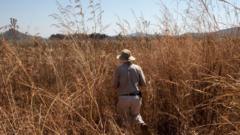In a groundbreaking move, Zimbabwe's government has announced an initial payout of $3 million to white farmers, the first of many payments related to a compensation agreement signed in 2020. This agreement promises a total of $3.5 billion in compensation for farmland seized during a controversial land reform program initiated in the early 2000s, which often involved forceful evictions of thousands of farmers.
Zimbabwe Begins Historic Compensation Payments to White Farmers Following Land Reform

Zimbabwe Begins Historic Compensation Payments to White Farmers Following Land Reform
Zimbabwe's government initiates the first compensation payments to white farmers whose land was seized, marking a significant step in mending ties with Western nations.
The initial payment will cover the first 378 of the 740 approved farms, representing a mere 1% of the $311 million allocated for this phase. Finance Minister Mthuli Ncube emphasized the importance of following through on the government's commitment as part of broader economic reforms and efforts to clear financial arrears.
While the announcement has led to renewed interest from some farmers in claiming compensation, many former landowners remain resistant, with most still holding onto their title deeds. Furthermore, the government has determined that compensation will only be offered for improvements made to the land rather than the land itself, citing the unfairness of prior colonial land seizures.
Compensation for foreign-owned farms has already been initiated under separate negotiations, indicating a focused strategy to engage with international investors and improve relations. Since gaining independence in 1980, Zimbabwe has grappled with the legacy of colonial land ownership, where a significant portion of the most fertile land was controlled by approximately 4,000 white farmers.
The legacy of land invasions endorsed by former President Robert Mugabe generated fierce international criticism and has left Zimbabwe isolated. Current President Emmerson Mnangagwa, who succeeded Mugabe in a coup in 2017, aims to restore Zimbabwe's relations with Western powers. The move to compensate former white farmers may signify a pivotal moment in this effort to repair international relations and revive Zimbabwe’s struggling economy, which has faced significant challenges over the past two decades.
As the country takes steps to emerge from economic isolation, analysts suggest that these compensation payments signal progress in mending relations with Western countries and may prevent further international condemnation or sanctions against Zimbabwe.
While the announcement has led to renewed interest from some farmers in claiming compensation, many former landowners remain resistant, with most still holding onto their title deeds. Furthermore, the government has determined that compensation will only be offered for improvements made to the land rather than the land itself, citing the unfairness of prior colonial land seizures.
Compensation for foreign-owned farms has already been initiated under separate negotiations, indicating a focused strategy to engage with international investors and improve relations. Since gaining independence in 1980, Zimbabwe has grappled with the legacy of colonial land ownership, where a significant portion of the most fertile land was controlled by approximately 4,000 white farmers.
The legacy of land invasions endorsed by former President Robert Mugabe generated fierce international criticism and has left Zimbabwe isolated. Current President Emmerson Mnangagwa, who succeeded Mugabe in a coup in 2017, aims to restore Zimbabwe's relations with Western powers. The move to compensate former white farmers may signify a pivotal moment in this effort to repair international relations and revive Zimbabwe’s struggling economy, which has faced significant challenges over the past two decades.
As the country takes steps to emerge from economic isolation, analysts suggest that these compensation payments signal progress in mending relations with Western countries and may prevent further international condemnation or sanctions against Zimbabwe.




















